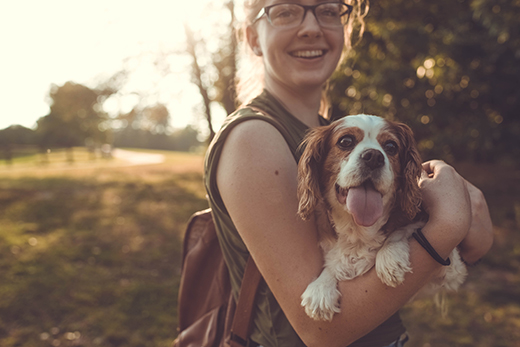K-State veterinarian shares tips for a bite-free quarantine
Monday, May 11, 2020

While spending more time together can be fun for both pets and their owners during the COVID-19 pandemic, a Kansas State University veterinarian says that it also can be a stressful time for dogs that results in unusual behavior, including biting.
MANHATTAN — A lot of pets and pet owners have been spending more time together because of COVID-19. But while the extra time together can be fun for both pets and their owners, a Kansas State University veterinarian says that it also can be a stressful time for dogs that results in unusual behavior, including biting.
According to the American Veterinary Medical Association, there are an estimated 77 million dogs living in the U.S. and 38% of U.S. homes have at least one dog.
"The AVMA also estimates that more than 17,800 dog bites occur every year in the United States, with many of the victims children under 2 years of age," said Susan Nelson, clinical professor and veterinarian with the K-State Pet Health Center. "According to the Insurance Information Institute, dog bites resulted in homeowner insurance payouts of $796.8 million in 2019. This was a 2.9% increase over the previous year. The national average for insurance claims related to a dog bite is $44,760."
Nelson has tips for both pets and their owners to stay safe and avoid biting experiences.
"If you have a new puppy, it is very important to socialize it properly as well-socialized dogs are less likely to bite due to fear of strange people or being stressed by being in an unfamiliar environment," Nelson said. "This needs to happen very early during the first few months of life as this is a puppy's critical formative time. Ask your veterinarian for tips and good resources on how to do this."
Nelson also recommends using positive reinforcement during training, avoiding rough play between humans and dogs, giving dogs a safe space to enjoy meals where they won't feel threatened by other animals or humans, and giving dogs ample rest time to be away from both humans and other pets.
"Humans are responsible for keeping themselves and their pets safe in difficult situations to avoid bites," Nelson said. "Assume that all dogs are capable of biting — because they are. Dogs need a safe place where they can go to be alone and not be bothered by people or other pets. This can be in the form of a crate, bed or small room."
Nelson cautions that children and pets should never be left unattended and children should be taught to never approach an unfamiliar or sick dog, take a treat or food from a dog, or to never crowd a dog in a manner that could bring the animal stress. She emphasizes the importance of making sure all family members are educated on animal safety. This includes respecting the animal's need for privacy.
Finally, Nelson said it's important to keep dogs current on rabies vaccines.
"Dog bite prevention needs to be practiced year-round for the safety of people, especially our children, and for the benefit of our dogs," she said.
